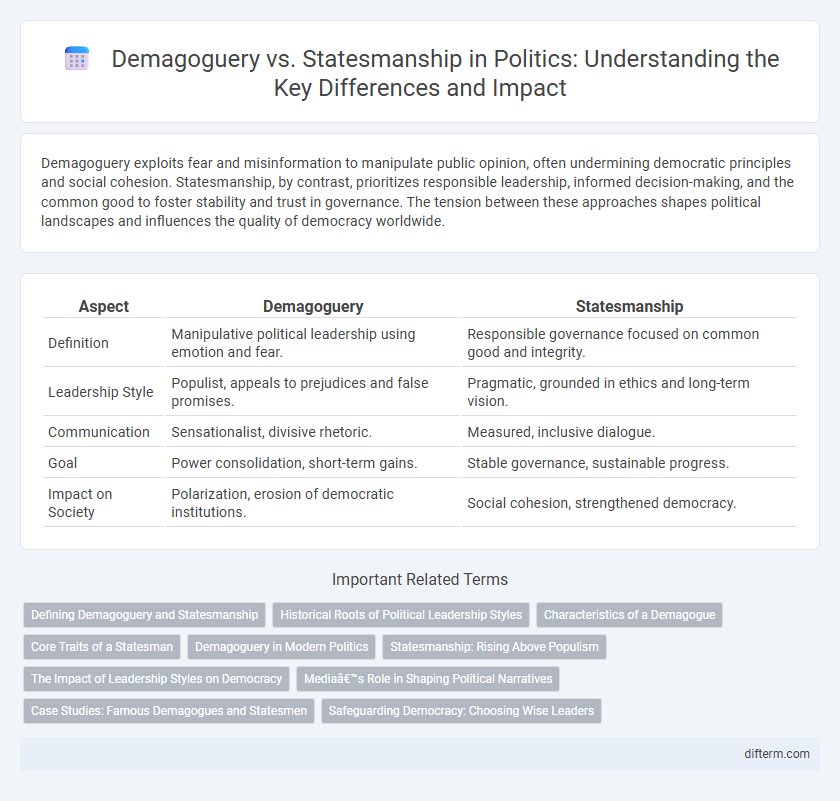Demagoguery exploits fear and misinformation to manipulate public opinion, often undermining democratic principles and social cohesion. Statesmanship, by contrast, prioritizes responsible leadership, informed decision-making, and the common good to foster stability and trust in governance. The tension between these approaches shapes political landscapes and influences the quality of democracy worldwide.
Table of Comparison
| Aspect | Demagoguery | Statesmanship |
|---|---|---|
| Definition | Manipulative political leadership using emotion and fear. | Responsible governance focused on common good and integrity. |
| Leadership Style | Populist, appeals to prejudices and false promises. | Pragmatic, grounded in ethics and long-term vision. |
| Communication | Sensationalist, divisive rhetoric. | Measured, inclusive dialogue. |
| Goal | Power consolidation, short-term gains. | Stable governance, sustainable progress. |
| Impact on Society | Polarization, erosion of democratic institutions. | Social cohesion, strengthened democracy. |
Defining Demagoguery and Statesmanship
Demagoguery involves manipulating public emotions and prejudices to gain power, often through rhetoric that appeals to fears and desires rather than reasoned debate. Statesmanship is characterized by responsible leadership that prioritizes the common good, informed decision-making, and the balancing of diverse interests for long-term societal stability. The contrast lies in demagoguery's exploitation of division versus statesmanship's commitment to unity and principled governance.
Historical Roots of Political Leadership Styles
Demagoguery and statesmanship have distinct historical roots reflecting contrasting approaches to political leadership; demagoguery often traces back to ancient Athens where leaders exploited popular emotions for personal gain, while statesmanship is rooted in the philosophies of Plato and Cicero, emphasizing wisdom, justice, and long-term governance. Political thinkers like Machiavelli further explored these styles, highlighting the tension between manipulative tactics and principled leadership. Understanding these origins is essential for analyzing modern political dynamics and leadership effectiveness.
Characteristics of a Demagogue
A demagogue manipulates popular desires and prejudices to gain power, often using emotional appeals, misinformation, and fearmongering. They undermine democratic principles by disregarding facts and promoting divisiveness to consolidate their influence. Unlike a statesman who prioritizes reasoned dialogue and public interest, a demagogue exploits societal tensions for personal or political gain.
Core Traits of a Statesman
A statesman demonstrates integrity, foresight, and a commitment to the public good, prioritizing long-term national interests over short-term popularity. Core traits include the ability to engage in reasoned dialogue, exhibit emotional intelligence, and foster unity across diverse political factions. Unlike demagoguery, statesmanship relies on evidence-based decision-making and principled leadership to sustain democratic institutions.
Demagoguery in Modern Politics
Demagoguery in modern politics often exploits widespread fears and misinformation to manipulate public opinion, undermining democratic institutions and eroding trust in legitimate governance. Political leaders who engage in demagoguery prioritize emotional appeals and divisive rhetoric over policy substance and reasoned debate. This trend exacerbates polarization, hinders effective policymaking, and threatens the stability of democratic systems worldwide.
Statesmanship: Rising Above Populism
Statesmanship embodies the art of governance grounded in wisdom, integrity, and long-term vision, contrasting starkly with demagoguery's appeal to base emotions and short-term gains. True statesmen prioritize the common good and the rule of law, fostering inclusive policies that transcend populist rhetoric. By rising above populism, statesmanship ensures stable institutions and promotes sustainable social cohesion.
The Impact of Leadership Styles on Democracy
Demagoguery undermines democratic principles by exploiting emotional appeals and spreading misinformation to manipulate public opinion, leading to polarization and weakened institutions. Statesmanship, characterized by reasoned decision-making, integrity, and a commitment to the common good, fosters political stability and public trust. Leadership styles directly influence the resilience of democracy, with statesmanship promoting inclusive governance and demagoguery threatening democratic norms and citizen engagement.
Media’s Role in Shaping Political Narratives
Media platforms significantly influence political narratives by often amplifying demagogic rhetoric to attract higher engagement, which can overshadow nuanced statesmanship. Sensationalist coverage prioritizes emotional appeal and simplification, distorting complex policy discussions and reducing public understanding of genuine leadership qualities. Consequently, the media's focus shapes public perception by promoting spectacle over substance, impacting electoral outcomes and democratic discourse.
Case Studies: Famous Demagogues and Statesmen
Famous demagogues like Adolf Hitler and Joseph McCarthy exploited fear and propaganda to manipulate public opinion and consolidate power through divisive rhetoric. In contrast, statesmen such as Winston Churchill and Nelson Mandela demonstrated visionary leadership and diplomatic skills, guiding nations through crises with integrity and collaboration. Case studies reveal that while demagoguery thrives on short-term emotional appeal, statesmanship fosters long-term national stability and unity.
Safeguarding Democracy: Choosing Wise Leaders
Demagoguery undermines democratic principles by exploiting fear and misinformation, eroding public trust and polarizing society. Statesmanship, by contrast, prioritizes reasoned debate, inclusive governance, and long-term stability essential for safeguarding democracy. Electing wise leaders committed to transparency and accountability strengthens institutions and protects democratic values against authoritarian threats.
Demagoguery vs Statesmanship Infographic

 difterm.com
difterm.com